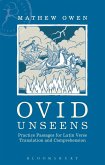The Latin poet Ovid was famously exiled by the Emperor Augustus to the shores of the Black Sea for his self-confessed crimes of 'a poem and a mistake'. Throughout his poetry, he discusses his exile and embraces the themes of marginality and alterity.
This core motif is explored throughout this overview of Ovid's life, the society he lived in and his innovative, perennially popular body of work. Presenting basic biographical information and the historical context of the newly Augustan Rome, the book details the contextual instabilities inherent in living at the border between republic and empire. Examining Ovid's poetic representations of 'otherness' from self-portraits to the mythological characters who populate his work, and his audacious experiments with genre, metre and poetic form, the book provides a coherent and original look at this much-studied author.
An analysis of Ovid's parodic spirit alongside his more serious exposure of the workings of power reveals his focus on the powerless, the marginalized and the aberrant, as well as Ovid's treatment of the powerful and the abuses they perpetuate.
Intelligible to readers with little or no experience of Ovid, all passages of Latin are translated and the work includes relevant maps, glossaries, a timeline and suggestions for further reading.
This core motif is explored throughout this overview of Ovid's life, the society he lived in and his innovative, perennially popular body of work. Presenting basic biographical information and the historical context of the newly Augustan Rome, the book details the contextual instabilities inherent in living at the border between republic and empire. Examining Ovid's poetic representations of 'otherness' from self-portraits to the mythological characters who populate his work, and his audacious experiments with genre, metre and poetic form, the book provides a coherent and original look at this much-studied author.
An analysis of Ovid's parodic spirit alongside his more serious exposure of the workings of power reveals his focus on the powerless, the marginalized and the aberrant, as well as Ovid's treatment of the powerful and the abuses they perpetuate.
Intelligible to readers with little or no experience of Ovid, all passages of Latin are translated and the work includes relevant maps, glossaries, a timeline and suggestions for further reading.









